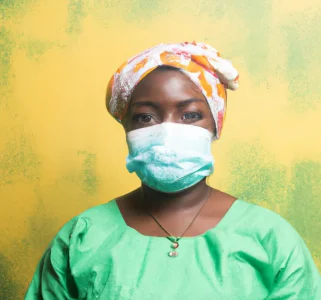Nigeria, the giant of Africa, boasts a diverse and vibrant population but also faces significant health challenges that demand urgent attention. The country faces various health problems affecting millions, from infectious to non-communicable diseases (NCDs). This article sheds light on Nigeria's top six health challenges, urging its citizens to take note and join hands in combating these pressing concerns for a healthier nation.

Battling Infectious Diseases
Infectious diseases remain a grave concern in Nigeria, with malaria leading the pack. Despite considerable efforts to combat this mosquito-borne illness, malaria claims thousands of lives yearly, particularly among vulnerable groups such as children and pregnant women. Other infectious diseases like HIV/AIDS and tuberculosis also pose significant threats, requiring sustained efforts to prevent, diagnose, and treat affected individuals.
Nigeria must invest in comprehensive public health programs that address these challenges effectively. These programs should include mosquito control measures, widespread use of insecticide-treated bed nets, and improved access to antiretroviral treatment for HIV patients.
Addressing Maternal and Child Health
Tragically, Nigeria experiences one of the highest maternal mortality rates globally. Insufficient access to quality healthcare during pregnancy and childbirth leads to preventable deaths of both mothers and infants. Additionally, malnutrition among children remains a significant issue, causing stunted growth and increased vulnerability to diseases.
Improving maternal and child health necessitates increased investments in maternal care facilities, skilled birth attendants, and nutrition programs. Initiatives that promote exclusive breastfeeding and nutritional supplementation can play a pivotal role in enhancing child health and reducing malnutrition rates.
The Rise of Non-Communicable Diseases (NCDs)
As Nigeria undergoes urbanization and lifestyle changes, non-communicable diseases (NCDs) have surged. Conditions like hypertension, diabetes, cardiovascular diseases, and cancer now pose formidable health challenges. The adoption of sedentary lifestyles, poor dietary habits, and tobacco use contribute to the rising prevalence of these NCDs.
A multi-faceted approach is essential to combat NCDs, involving public awareness campaigns, promoting healthy living, and regular early detection and management screenings. The government should also strengthen healthcare systems to deliver quality care for NCD patients.
The Dilemma of Malnutrition
Nigeria faces a double burden of malnutrition, with both undernutrition and overnutrition being pressing issues. Undernutrition affects a significant portion of the population, leading to malnourished children and heightened vulnerability to infections. Conversely, obesity rates are rising due to changing dietary habits and increasingly sedentary lifestyles.
The government must prioritize nutrition interventions to tackle malnutrition, such as fortification programs, nutrition education, and school feeding initiatives. Addressing undernutrition and overnutrition is crucial to building a healthier future for the nation.
Limited Access to Healthcare
Access to healthcare remains a significant challenge, particularly in rural areas with inadequate healthcare infrastructure and services. Many Nigerians struggle to access even primary healthcare, resulting in disparities in health outcomes across different regions.
To enhance healthcare access, the government must invest in expanding healthcare facilities, particularly in underserved areas. Initiatives to incentivize healthcare professionals to work in rural areas and the implementation of telemedicine solutions could also make a significant impact.
Focusing on Mental Health
Mental health is a growing concern in Nigeria, with many individuals facing depression, anxiety, and substance abuse. Unfortunately, a lack of awareness and a significant stigma surrounding mental health prevents individuals from seeking help.
Addressing mental health challenges requires a multi-pronged approach, including public awareness campaigns, community-based support systems, and integrating mental health services into primary healthcare settings. By breaking the silence and addressing mental health openly, Nigeria can work towards fostering a mentally resilient society.
Nigeria's health challenges demand the collective efforts of its citizens, healthcare professionals, and policymakers. From combating infectious diseases to improving maternal and child health, addressing NCDs, malnutrition, limited healthcare access, and mental health, a concerted approach is essential to build a healthier and thriving nation. By acknowledging these challenges and working together, Nigerians can pave the way for a brighter, healthier future for future generations.

Battling Infectious Diseases
Infectious diseases remain a grave concern in Nigeria, with malaria leading the pack. Despite considerable efforts to combat this mosquito-borne illness, malaria claims thousands of lives yearly, particularly among vulnerable groups such as children and pregnant women. Other infectious diseases like HIV/AIDS and tuberculosis also pose significant threats, requiring sustained efforts to prevent, diagnose, and treat affected individuals.
Nigeria must invest in comprehensive public health programs that address these challenges effectively. These programs should include mosquito control measures, widespread use of insecticide-treated bed nets, and improved access to antiretroviral treatment for HIV patients.
Addressing Maternal and Child Health
Tragically, Nigeria experiences one of the highest maternal mortality rates globally. Insufficient access to quality healthcare during pregnancy and childbirth leads to preventable deaths of both mothers and infants. Additionally, malnutrition among children remains a significant issue, causing stunted growth and increased vulnerability to diseases.
Improving maternal and child health necessitates increased investments in maternal care facilities, skilled birth attendants, and nutrition programs. Initiatives that promote exclusive breastfeeding and nutritional supplementation can play a pivotal role in enhancing child health and reducing malnutrition rates.
The Rise of Non-Communicable Diseases (NCDs)
As Nigeria undergoes urbanization and lifestyle changes, non-communicable diseases (NCDs) have surged. Conditions like hypertension, diabetes, cardiovascular diseases, and cancer now pose formidable health challenges. The adoption of sedentary lifestyles, poor dietary habits, and tobacco use contribute to the rising prevalence of these NCDs.
A multi-faceted approach is essential to combat NCDs, involving public awareness campaigns, promoting healthy living, and regular early detection and management screenings. The government should also strengthen healthcare systems to deliver quality care for NCD patients.
The Dilemma of Malnutrition
Nigeria faces a double burden of malnutrition, with both undernutrition and overnutrition being pressing issues. Undernutrition affects a significant portion of the population, leading to malnourished children and heightened vulnerability to infections. Conversely, obesity rates are rising due to changing dietary habits and increasingly sedentary lifestyles.
The government must prioritize nutrition interventions to tackle malnutrition, such as fortification programs, nutrition education, and school feeding initiatives. Addressing undernutrition and overnutrition is crucial to building a healthier future for the nation.
Limited Access to Healthcare
Access to healthcare remains a significant challenge, particularly in rural areas with inadequate healthcare infrastructure and services. Many Nigerians struggle to access even primary healthcare, resulting in disparities in health outcomes across different regions.
To enhance healthcare access, the government must invest in expanding healthcare facilities, particularly in underserved areas. Initiatives to incentivize healthcare professionals to work in rural areas and the implementation of telemedicine solutions could also make a significant impact.
Focusing on Mental Health
Mental health is a growing concern in Nigeria, with many individuals facing depression, anxiety, and substance abuse. Unfortunately, a lack of awareness and a significant stigma surrounding mental health prevents individuals from seeking help.
Addressing mental health challenges requires a multi-pronged approach, including public awareness campaigns, community-based support systems, and integrating mental health services into primary healthcare settings. By breaking the silence and addressing mental health openly, Nigeria can work towards fostering a mentally resilient society.
Nigeria's health challenges demand the collective efforts of its citizens, healthcare professionals, and policymakers. From combating infectious diseases to improving maternal and child health, addressing NCDs, malnutrition, limited healthcare access, and mental health, a concerted approach is essential to build a healthier and thriving nation. By acknowledging these challenges and working together, Nigerians can pave the way for a brighter, healthier future for future generations.




